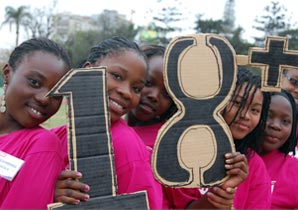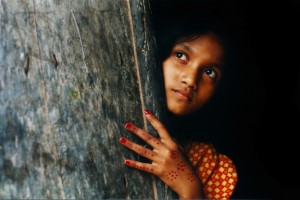Wedding Busters: Betting on Child Marriage-Free Zones
Apr 26th, 2014 | By admin | Category: Featured, Youth RightsBy Suzanne York.
Child marriage is a difficult issue that is complicated by culture and religion, and especially by poverty.It takes time and effort to change culture, but it is possible. Ending poverty is something that many people, organizations, and governments have tried to end for decades, but the challenge is enormous.Yet the will and the way to empower girls is something that can be done now. Gordon Brown, former prime minister of the UK and now a United Nations Special Envoy on Global Education, is spurring global action on the rights of girls.
Busting Child Marriage
According to the UN, one in nine girls is married by age 15. By 2020, one in three girls in developing countries will be married by age 18. That is 142 million girls. Countries with the highest prevalence of child marriage are in Western and Sub-Saharan Africa; but based on population size, the largest number of child brides are found in South Asia.
An intriguing way to change and end the practice of girls marrying too young is creating “child marriage-free zones” where girls stand together and refuse to be married. There are zones in Pakistan and Bangladesh, and soon to start in Malawi.
In Bangladesh, it is called”wedding busters”, where there groups of around 20 youth, who campaign against child marriage and intervene to stop it on a girl’s behalf. The UK Guardian had a good article in 2012 on how this works for Bangladeshis.
Here is a video by Plan International on how one community is working to convince people of the detrimental impacts of child marriage:
Plan International is just one of many groups calling on governments and civil society to end the practice and believes that “Awareness-raising activities should promote education and dialogue to change social norms and attitudes which perpetuate child marriage. Programs should also promote the role which men and boys can play in ending child marriage and other harmful practices.”
Brown, in announcing the creation of child-marriage-free zones in Pakistan in early April, emphasized that “What we want to do is to encourage girls themselves to be aware of their rights, to encourage teachers and girls to work together to say that when people try to force them into early marriage, it’s not acceptable.”
It is an effort to keep girls in school, as well as keep them healthy. Girls that marry before age 18 often face serious health complications from getting pregnant at a very young age, or even death. Pregnancy is the leading cause of death worldwide for girls ages 15-19.
The Poverty Factor
One reason that girls are married off at a young age is due to poverty. Oftentimes, a family cannot afford to feed another child (much less educate, especially a girl), so marriage is a way to reduce the burden on poor families.
The International Center for Research on Women (ICRW) states that girls living in poor households are almost twice as likely to marry before 18 than girls in higher income households.
The UN has pledged to invest $10 million toward educating Pakistani children, and the European Union is giving 100 million Euros.
Suzanne Petroni of ICRW called for providing financial support and incentives to girls and their families to keep them from being married off. Perhaps some of the pledged money will go toward this. The U.S., which gives a lot of foreign aid to Pakistan, and spent $4 billion on drones in 2012, may want to consider how an investment in girls could pay off with a more stable country than drone strikes.
We know that girls’ education is a smart investment that results in huge benefits in terms of health, employment, equality and lifting people out of poverty.Above all, educating and teaching everyone – men and women, girls and boys – to value the life of a girl is paramount. Child marriage-free zones just might be the way to get people to understand the value of a girl.
Suzanne York is Project Director of Transition Earth.



